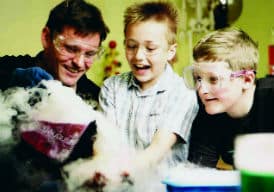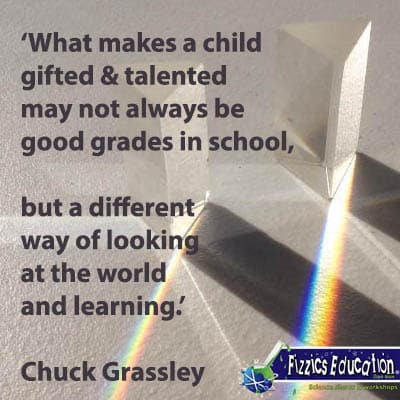
As most readers are aware, working with gifted children offers its own challenges when it comes to science. Our approach to any child, gifted or not, is to work with what they can do rather than concentrate on their particular age. Having supplementary material on hand is the best insurance to keep active minds busy, as well as being flexible enough to alter the lesson if the workshop tasks have been aimed too low or high. Simply, from our perspective we find that working with gifted children just means that you practice good teaching methods rather than concentrating on the tag ‘gifted’.
Still, even being used to working with different groups of gifted kids I still get surprised with what some of these children might have as prior knowledge. I can remember running a human body workshop with some gifted year 2 children and mentioning the various cell types found in the bloodstream. A child promptly noted that I should be calling red blood cells erythrocytes and that there are several types of white blood cells which use phagocytosis, the process of foreign cell engulfment, when fighting bacteria! Further investigation into the child’s background found that the child’s father was a haematologist and the child had been looking through his Dad’s medical school texts. Needless to say, the lesson objectives for this child were shifted to the content you might find in this year’s HSC biology exam!

‘What makes a child gifted and talented may not always be good grades in school, but a different way of looking at the world and learning.’ Chuck Grassley
The issue is that gifted students often don’t have access to opportunity classes and are generally placed within the mainstream student population. It is all well and good to change a lessons direction if you can, but this is often at the peril of losing the focus of the other students who would understand the concept but need more time (a precious commodity!). Solely catering to the gifted child will mean that the others miss out which is not really equitable. So, what to do? Try to anticipate where a lesson might go when working with gifted children. Have some materials set aside that the gifted kids can work on while the rest of the class works on the core lesson concepts. In other words, just be prepared to run ‘multiple lessons’ within the same lesson… a tough task I know! But if you spend the time on preparing a great unit of lessons that caters for all abilities from the outset, you’ll have greater engagement across the class regardless of ability. The best bit is that classroom behaviour will improve across the board… and your job gets easier!
All the best!























Comments